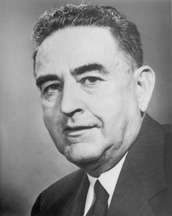W. Kerr Scott
| William Kerr Scott | |
|---|---|
 | |
| United States Senator from North Carolina | |
|
In office November 29, 1954 – April 16, 1958 | |
| Preceded by | Alton Lennon |
| Succeeded by | B. Everett Jordan |
| 62nd Governor of North Carolina | |
|
In office January 6, 1949 – January 8, 1953 | |
| Lieutenant | Hoyt Patrick Taylor |
| Preceded by | R. Gregg Cherry |
| Succeeded by | William B. Umstead |
| Personal details | |
| Born |
April 17, 1896 Haw River, North Carolina |
| Died |
April 16, 1958 (aged 61) Burlington, North Carolina |
| Political party | Democratic |
| Alma mater | North Carolina State University at Raleigh |
| Profession | Agriculture |
William Kerr Scott (April 17, 1896 – April 16, 1958) was a Democratic Party politician from North Carolina. He was the 62nd Governor of North Carolina from 1949 until 1953 and a United States Senator from 1954 until 1958.
A native of Alamance County, North Carolina and a farmer by training, Scott was a lifelong advocate for agricultural issues and became known in his home state as "the Squire of Haw River." He was elected as the state's Commissioner of Agriculture, but resigned that post to run for governor in 1948. His followers, popularly known as "Branchhead Boys," fervently supported Scott in all his campaigns and remained a force in North Carolina politics for more than a decade following his death.
Scott created the "Go Forward" program with approval from the state legislature in 1949. He also signed a $200 million rural road building program, leading to nearly 15,000 additional miles of paved road in the state.[1] Immediately following his term as governor, he represented North Carolina in the United States Senate from 1954 and 1958. His son, Bob Scott served as Governor from 1969 to 1973, and his granddaughter, Meg Scott Phipps served as North Carolina Commissioner of Agriculture from 2001 to 2003.
Scott is hailed as a forerunner when it comes to racial equality in the South. While he refrained from explicitly challenging institutions such as segregation, he consistently moved to advance the status of African Americans in government and society. He also sought to install individuals in office who favored the extension of full rights to African American citizens - the most noteworthy being University of North Carolina President Frank Porter Graham, whom Scott appointed to fill a vacant United States Senate seat in 1949.
Graham was regarded as one of the most racially and generally progressive figures in the South, and became victimized by pernicious attacks concerning his views on race relations when he campaigned the following year to maintain his senate seat. In an effort to defend Graham, Scott lent the full weight of his political organization to him and assiduously campaigned across North Carolina. Despite intervention from Scott, President Harry Truman, U.S. House Speaker Sam Rayburn, and others, Graham was defeated by conservative lawyer Willis Smith for the Democratic Party's nomination. The tenor of Willis Smith's campaign was considered so offensive that Scott's wife, First Lady Mary Scott, refused to shake the senator-elect's hand at an Executive Mansion reception.
Years later, when Scott elected to run for the same U.S. Senate seat which had been contested by Graham, he was queried by a local reporter about how his campaign would respond to the race-baiting strategies that are imputed with the loss of his appointee. To this, he is said to have grinned and replied, "I'll handle it, son. I'm not as good a Christian as Frank Porter Graham."
Scott attained the Senate seat by approximately 8,000 votes and served until he died of a heart attack in 1958. His son, Robert Scott, was also elected governor in the 1960s.
Scott died in Burlington, North Carolina on April 16, 1958 and is buried in Hawfields Presbyterian Church Cemetery in Mebane, North Carolina.
The W. Kerr Scott Dam and Reservoir in Wilkes County, North Carolina are named in honor of the governor.[2] While Senator, he greatly assisted in obtaining approval for construction of the dam and reservoir. In addition, a residence hall is named in his memory on the campus of East Carolina University and a technology building on the campus of Appalachian State University is named for him.
His home and farm, the Kerr Scott Farm, was added to the National Register of Historic Places in 1987.[3]
References
- ↑ "Proposed Highway Name Honors Store Owner". Greensboro News & Record. 5 May 1995.
- ↑ Byrd, Fay (19 October 2010). Wilkes County Bits and Pieces. Lulu.com. p. 328. ISBN 978-0-557-49244-2.
- ↑ National Park Service (2010-07-09). "National Register Information System". National Register of Historic Places. National Park Service.
Further reading
- Pleasants, Julian M. The Political Career of W. Kerr Scott: The Squire From Haw River (University Press of Kentucky; 2014) 406 pages
External links
- United States Congress. "W. Kerr Scott (id: S000187)". Biographical Directory of the United States Congress.
- W. Kerr Scott at Find a Grave
| Political offices | ||
|---|---|---|
| Preceded by R. Gregg Cherry |
Governor of North Carolina 1949–1953 |
Succeeded by William B. Umstead |
| Preceded by William A. Graham, Jr., |
13th North Carolina Commissioner of Agriculture 1923 – 1937 |
Succeeded by David S. Coltrane |
| United States Senate | ||
| Preceded by Alton Asa Lennon |
U.S. Senator (Class 2) from North Carolina 1954–1958 Served alongside: Sam Ervin |
Succeeded by Benjamin Everett Jordan |

